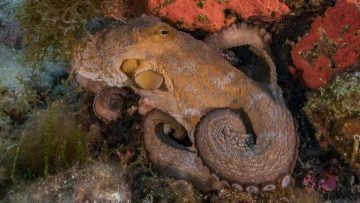Ed Yong in The Atlantic:

A small shark spots its prey—a meaty, seemingly defenseless octopus. The shark ambushes, and then, in one of the most astonishing sequences in the series Blue Planet II, the octopus escapes. First, it shoves one of its arms into the predator’s vulnerable gills. Once released, it moves to protect itself—it grabs discarded seashells and swiftly arranges them into a defensive dome.
Thanks to acts like these, cephalopods—the group that includes octopuses, squid, and cuttlefish—have become renowned for their intelligence. Octopuses, for example, have been seen unscrewing jar lids to get at hidden food, carrying coconut shells to use as armor, barricading their den with stones, and squirting jets of water to deter predators or short out aquarium lights. But why did they become intelligent in the first place? Why did this one group of mollusks, among an otherwise slow and dim-witted dynasty of snails, slugs, clams, oysters, and mussels, evolve into creatures that are famed for their big brains? These are hard questions to answer, especially because cephalopods aren’t just weirdly intelligent; they’re also very weird for intelligent animals. Members of the animal kingdom’s intelligentsia tend to be sociable; indeed, the need to remember and manage a complex network of relationships might have helped drive the evolution of their brains. Smart animals also tend to be long-lived, since a large brain both takes a long time to grow and helps an animal avoid danger. Apes, elephants, whales and dolphins, crows and other corvids, parrots: They all share these traits.
Cephalopods do not. With rare exceptions, most of them are solitary animals that aren’t above cannibalizing one another when they meet. Even those that swim in groups, like some squid, don’t form the kinds of deep social bonds that chimps or dolphins do. Cephalopods also tend to live fast and die young. Most have life spans shorter than two years, and many die after their first bout of sex and reproduction. This combination of short lives, solitude, and smarts is unique to cephalopods. And according to a recent paper by Piero Amodio from the University of Cambridge and five of his colleagues, the traits are all linked to a particular development in the octopus’s evolutionary history: Its ancestors lost their shells.
More here.
